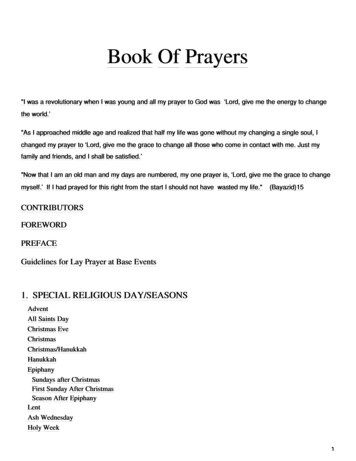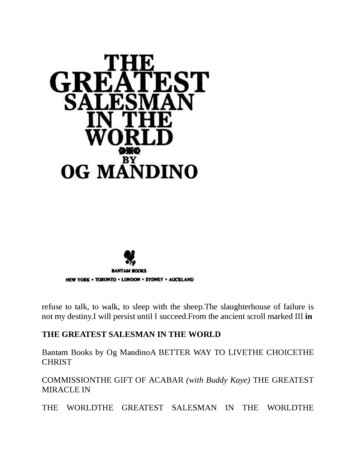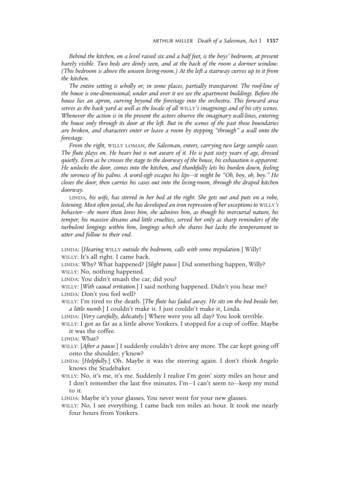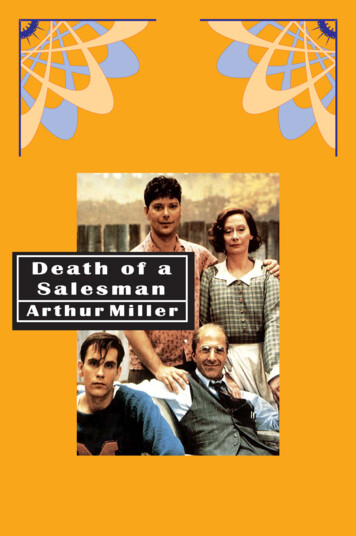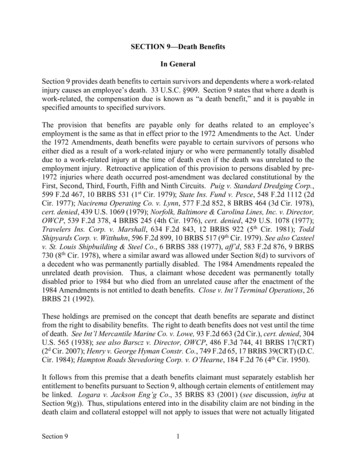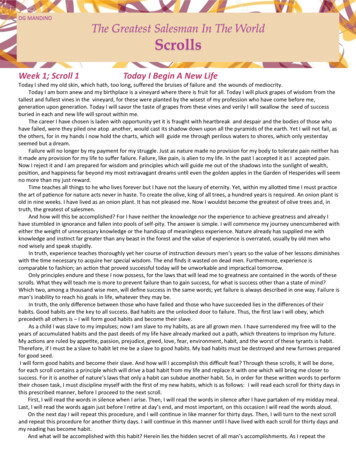
Transcription
Death of a SalesmanBy Arthur MillerRevision Notes
Summary and Analysis of the playAct I - Opening scene to Willy’s first daydreamSummaryThe play begins on a Monday evening at the Loman family home in Brooklyn. After some lightchanges on stage and ambient flute music (the first instance of a motif connected to Willy Loman’sfaint memory of his father, who was once a flute-maker and salesman), Willy, a sixty-three-year-oldtravelling salesman, returns home early from a trip, apparently exhausted. His wife, Linda, gets outof bed to greet him. She asks if he had an automobile accident, since he once drove off a bridge intoa river. Irritated, he replies that nothing happened. Willy explains that he kept falling into a trancewhile driving—he reveals later that he almost hit a boy. Linda urges him to ask his employer, HowardWagner, for a non-travelling job in New York City. Willy’s two adult sons, Biff and Happy, are visiting.Before he left that morning, Willy criticized Biff for working at manual labour on farms and horseranches in the West. The argument that ensued was left unresolved. Willy says that his thirty-fouryear-old son is a lazy bum. Shortly thereafter, he declares that Biff is anything but lazy. Willy’s habitof contradicting himself becomes quickly apparent in his conversation with Linda.Willy’s loud rambling wakes his sons. They speculate that he had another accident. Linda returns tobed while Willy goes to the kitchen to get something to eat. Happy and Biff reminisce about thegood old days when they were young. Although Happy, thirty-two, is younger than Biff, he is moreconfident and more successful. Biff seems worn, apprehensive, and confused. Happy is worriedabout Willy’s habit of talking to himself. Most of the time, Happy observes, Willy talks to the absentBiff about his disappointment in Biff’s unsteadiness. Biff hopped from job to job after high schooland is concerned that he has “waste[d] his life.” He is disappointed in himself and in the disparitybetween his life and the notions of value and success with which Willy indoctrinated him as a boy.Happy has a steady job in New York, but the rat race does not satisfy him. He and Biff fantasizebriefly about going out west together. However, Happy still longs to become an important executive.He sleeps with the girlfriends and fiancées of his superiors and often takes bribes in an attempt toclimb the corporate ladder from his position as an assistant to the assistant buyer in a departmentstore.Biff plans to ask Bill Oliver, an old employer, for a loan to buy a ranch. He remembers that Oliverthought highly of him and offered to help him anytime. He wonders if Oliver still thinks that he stolea carton of basketballs while he was working at his store. Happy encourages his brother,commenting that Biff is “well liked”—a sure predictor of success in the Loman household. The boysare disgusted to hear Willy talking to himself downstairs. They try to go to sleep.AnalysisIt is important to note that much of the play’s action takes place in Willy’s home. In the past, theBrooklyn neighbourhood in which the Lomans live was nicely removed from the bustle of New YorkCity. There was space within the neighbourhood for expansion and for a garden. When Willy andLinda purchased it, it represented the ultimate expression of Willy’s hopes for the future. Now,however, the house is hemmed in by apartment buildings on all sides, and sunlight barely reachestheir yard. Their abode has come to represent the reduction of Willy’s hopes, even though,ironically, his mortgage payments are almost complete. Just as the house is besieged by apartmentbuildings, Willy’s ego is besieged by doubts and mounting evidence that he will never experience thefame and fortune promised by the American Dream.
Willy’s reality profoundly conflicts with his hopes. Throughout his life, he has constructed elaboratefantasies to deny the mounting evidence of his failure to fulfil his desires and expectations. By thetime the play opens, Willy suffers from crippling self-delusion. His consciousness is so fractured thathe cannot even maintain a consistent fantasy. In one moment, he calls Biff a lazy bum. In the next,he says that Biff is anything but lazy. His later assessment of the family car is similarlycontradictory—one moment he calls it a piece of trash, the next “the finest car ever built.” LabellingBiff a lazy bum allows Willy to deflect Linda’s criticism of his harangue against Biff’s lack of materialsuccess, ambition, and focus. Denying Biff’s laziness enables Willy to hold onto the hope that Biff willsomeday, in some capacity, fulfil his expectations of him. Willy changes his interpretation of realityaccording to his psychological needs at the moment. He is likewise able to reimagine decisivemoments in his past in his later daydreams. Ironically, he asks Linda angrily why he is “always beingcontradicted,” when it is usually he who contradicts himself from moment to moment.The opening pages of the play introduce the strangely affected and stilted tone of the dialogue,which transcends the 1 9 5 0 S idiom of nonspecific pet names (an ungendered “pal” or “kid” for adultand child alike) and dated metaphors, vocabulary, and slang. Some critics cite the driving, emphatic,repetitive diction (“Maybe it’s your glasses. You never went for your new glasses”; “I’m the NewEngland man. I’m vital in New England”) and persistent vexed questioning (“Why do you getAmerican when I like Swiss?” “How can they whip cheese?”) as a particularly Jewish-American idiom,but the stylization of the speech serves a much more immediate end than stereotype or bigotry.Miller intended the singsong melodies of his often miserable and conflicted characters to parallel thecomplex struggle of a family with a skewed version of the American Dream trying to support itself.The dialogue’s crooked, blunt lyricism of stuttering diction occasionally rises even to the level of thegrotesque and inarticulate, as do the characters themselves. Miller himself claims in hisautobiography that the characters in Death of a Salesman speak in a stylized manner “to lift theexperience into emergency speech of an unabashedly open kind rather than to proceed by thecrabbed dramatic hints and pretexts of the ‘natural.’ ”Willy’s first daydream to the first appearance of The WomanSummaryWilly is lost in his memories. Suddenly, the memories of his sons’ childhood come alive. Young Biffand Happy wash and wax their father’s car after he has just returned from a sales trip. Biff informsWilly that he “borrowed” a football from the locker room to practice. Willy laughs knowingly. Happytries to get his father’s attention, but Willy’s preference for Biff is obvious. Willy whispers that he willsoon open a bigger business than his successful neighbour Uncle Charley because Charley is not as“well liked” as he is. Charley’s son, Bernard, arrives to beg Biff to study math with him. Biff is close tofailing math, which would prevent him from graduating. Willy orders Biff to study. Biff distracts himby showing him that he printed the insignia of the University of Virginia on his sneakers, impressingWilly. Bernard states that the sneakers do not mean Biff will graduate. After Bernard leaves, Willyasks if Bernard is liked. The boys reply that he is liked but not “well liked.” Willy tells them thatBernard may make good grades, but Happy and Biff will be more successful in business because theyare “well liked.”Still in his daydream of fifteen years ago, Willy brags to Linda that he made 1 2 0 0 in sales thatweek. Linda quickly figures his commission at over 2 0 0 . Willy then hedges his estimation. Underquestioning, he admits that he grossed only 2 0 0 . The 7 0 commission is barely adequate to coverthe family’s expenses. In a rare moment of lucidity and self-criticism, Willy moans that he cannotmove ahead because people do not seem to like him. Linda tells him that he is successful enough.Willy complains that he talks and jokes too much. He explains that Charley earns respect because he
is a man of few words. His jealousy of his neighbour becomes painfully clear. Willy thinks peoplelaugh at him for being too fat; he once punched a man for joking about his “walrus” physique. AsLinda assures him that he is the handsomest man ever, Willy replies that she is his best friend in theworld. Just as he tells her that he misses her terribly when he is on the road, The Woman’s laughtersounds from the darkness.AnalysisOne of the most interesting aspects of Death of a Salesman is its fluid treatment of time: past andpresent flow into one another seamlessly and simultaneously as various stimuli induce in Willy arambling stream-of-consciousness. It is important to remember that the idyllic past that Willy recallsis one that he reinvents; one should not, therefore, take these seeming flashbacks entirely as truth.The idyllic past functions as an escape from the present reality or a retrospective reconstruction ofpast events and blunders. Even when he retreats to this idyllic past, however, Willy cannotcompletely deny his real situation. He retreats into his daydreams not only to escape the present butalso to examine the past. He searches for the mistake that he made that frustrated his hopes forfame and fortune and destroyed his relationship with Biff. Willy’s treatment of his life as a story tobe edited and rewritten enables him to avoid confronting its depressing reality.It is important to examine the evolution of Willy’s relationship with his family, as the solid family isone of the most prominent elements of the American Dream. In the present, Willy’s relationshipwith his family is fraught with tension. In his memories, on the other hand, Willy sees his family ashappy and secure. But even Willy’s conception of the past is not as idyllic as it seems on the surface,as his split consciousness, the profound rift in his psyche, shows through. No matter how much hewants to remember his past as all-American and blissful, Willy cannot completely erase the evidenceto the contrary. He wants to remember Biff as the bright hope for the future. In the midst of hismemories, however, we find that Willy does nothing to discourage Biff’s compulsive thieving habit.In fact, he subtly encourages it by laughing at Biff’s theft of the football.As an adult, Biff has never held a steady job, and his habitual stealing from employers seems largelyto be the reason for this failing. Over the years, Biff and Willy have come to a mutual antagonism.Willy is unable to let go of his commitment to the American Dream, and he places tremendouspressure on Biff to fulfil it for him. Biff feels a deep sense of inadequacy because Willy wants him topursue a career that conflicts with his natural inclinations and instincts. He would rather work in theopen air on a ranch than enter business and make a fortune, and he believes that Willy’s naturalinclination is the same, like his father’s before him.Willy’s relationship with Happy is also less than perfect in Willy’s reconstruction of the past, and it isclear that he favours Biff. Happy tries several times to gain Willy’s attention and approval but fails.The course of Happy’s adult life clearly bears the marks of this favouritism. Happy doesn’t expressresentment toward Biff; rather, he emulates the behaviour of the high-school-aged Biff. In the past,Willy expressed admiration for Biff’s success with the girls and his ability to get away with theft. Asan adult, Happy competes with more successful men by sleeping with their women—he thusperforms a sort of theft and achieves sexual prowess.Willy’s relationship with Linda is even more complex and interesting. In one of his moments of selfdoubt, she assures him that he is a good provider and that he is handsome. She also sees through hislie when he tries to inflate his commission from his latest trip. Although she does not buy his pitch toher, she still loves him. His failure to make her believe his fantasy of himself does not lead her toreject him—she does not measure Willy’s worth in terms of his professional success. Willy, however,needs more than love, which accepts character flaws, doubts, and insecurity—he seeks desperately
to be “well liked.” As such, he ignores the opportunity that Linda presents to him: to view himselfmore honestly, to acknowledge the reality of his life, and to accept himself for what he is withoutfeeling like a failure. Instead, he tries to play the salesman with her and their sons.After The Woman’s laughter through Ben’s first appearance in Willy’s daydreamSummaryThe Woman is Willy’s mistress and a secretary for one of his buyers. In Willy’s daydream, they sit in ahotel room. She tells him that she picked him because he is so funny and sweet. Willy loves thepraise. She thanks Willy for giving her stockings and promises to put him right through to the buyerswhen she sees him next. The Woman fades into the darkness as Willy returns to his conversationwith Linda in the present. He notices Linda mending stockings and angrily demands that she throwthem out—he is too proud to let his wife wear an old pair (Biff later discovers that Willy has beenbuying new stockings for The Woman instead of for Linda). Bernard returns to the Loman house tobeg Biff to study math. Willy orders him to give Biff the answers. Bernard replies that he cannot doso during a state exam. Bernard insists that Biff return the football. Linda comments that somemothers fear that Biff is “too rough” with their daughters. Willy, enraged by the unglamorous truthof his son’s behavior, plunges into a state of distraction and shouts at them to shut up. Bernardleaves the house, and Linda leaves the room, holding back tears.The memory fades. Willy laments to himself and Happy that he did not go to Alaska with his brother,Ben, who acquired a fortune at the age of twenty-one upon discovering an African diamond mine.Charley, having heard the shouts, visits to check on Willy. They play cards. Charley, concerned aboutWilly, offers him a job, but Willy is insulted by the offer. He asks Charley if he saw the ceiling he putin his living room, but he becomes surly when Charley expresses interest, insisting that Charley’s lackof skill with tools proves his lack of masculinity. Ben appears on the stage in a semi-daydream. Hecuts a dignified, utterly confident figure. Willy tells Charley that Ben’s wife wrote from Africa to tellthem Ben had died. He alternates between conversing with Charley and his dead brother. Willy getsangry when Charley wins a hand, so Charley takes his cards and leaves. He is disturbed that Willy isso disoriented that he talks to a dead brother as if he were present. Willy immerses himself in thememory of a visit from his brother. Ben and Willy’s father abandoned the family when Willy wasthree or four years old and Ben was seventeen. Ben left home to look for their father in Alaska butnever found him. At Willy’s request, Ben tells young Biff and Happy about their grandfather. Amongan assortment of other jobs, Willy and Ben’s father made flutes and sold them as a travellingsalesman before following a gold rush to Alaska. Ben proceeds to wrestle the young Biff to theground in a demonstration of unbridled machismo, wielding his umbrella threateningly over Biff’seye. Willy begs Ben to stay longer, but Ben hurries to catch his train.AnalysisJust as the product that Willy sells is never specified, so too does The Woman, with whom Willycommits adultery, remain nameless. Miller offers no description of her looks or character becausesuch details are irrelevant; The Woman merely represents Willy’s discontent in life. Indeed, she ismore a symbol than an actual human being: she regards herself as a means for Willy to get to thebuyers more efficiently, and Willy uses her as a tool to feel well liked. Biff sees her as a sign thatWilly and his ambitions are not as great as Willy claims.Willy’s compulsive need to be “well liked” contributes to his descent into self-delusion. WhereasLinda loves Willy despite his considerable imperfections, Willy’s mistress, on the other hand, merelylikes him. She buys his sales pitch, which boosts his ego, but does not care for him deeply the wayLinda does. Linda regards Willy’s job merely as a source of income; she draws a clear line between
Willy as a salesman and Willy as her husband. Willy is unable to do so and thus fails to accept thelove that Linda and his sons offer him.Willy was first abandoned by his father and later by his older brother, Ben. Willy’s father was asalesman as well, but he actually produced what he sold and was successful, according to Ben, atleast. Ben presents their father as both an independent thinker and a masculine man skilled with hishands. In a sense, Willy’s father, not Willy himself, represents the male ideal to Biff, a pioneer spiritand rugged individualist. Unlike his father, Willy does not attain personal satisfaction from the thingsthat he sells because they are not the products of his personal efforts—what he sells is himself, andhe is severely damaged and psychically ruptured. His professional persona is the only thing that hehas produced himself. In a roundabout manner, Willy seeks approval from his professional contactsby trying to be “well liked”—a coping strategy to deal with his abandonment by the two mostimportant male figures in his life.Willy’s efforts to create the perfect family of the American Dream seem to constitute an attempt torebuild the pieces of the broken family of his childhood. One can interpret his decision to become asalesman as the manifestation of his desperate desire to be the good father and provider that hisown salesman father failed to be. Willy despairs about leaving his sons nothing in the form of amaterial inheritance, acutely aware that his own father abandoned him and left him with nothing.Willy’s obsession with being well liked seems to be rooted in his reaction to his father’s andbrother’s abandoning of him—he takes their rejection of him as a sign of their not liking him enough.Willy’s memory of Ben’s visit to his home is saturated with fears of abandonment and a need forapproval. When Ben declares that he must leave soon in order to catch his train, Willy desperatelytries to find some way to make him stay a little longer. He proudly shows his sons to Ben, practicallybegging for a word of approval. Additionally, he pleads with Ben to tell Biff and Happy about theirgrandfather, as he realizes that he has no significant family history to give to his sons as aninheritance; the ability to pass such a chronicle on to one’s offspring is an important part of theAmerican Dream that Willy so highly esteems.From Ben’s departure through the closing sceneSummaryWilly’s shouts wake Linda and Biff, who find Willy outside in his slippers. Biff asks Linda how long hehas been talking to himself, and Happy joins them outside. Linda explains that Willy’s mentalunbalance results from his having lost his salary (he now works only on commission). Linda knowsthat Willy borrows fifty dollars a week from Charley and pretends it is his salary. Linda claims thatBiff and Happy are ungrateful. She calls Happy a “philandering bum.” Angry and guilt-ridden, Biffoffers to stay home and get a job to help with expenses. Linda says that he cannot fight with Willy allthe time. She explains that all of his automobile accidents are actually failed suicide attempts. Sheadds that she found a rubber hose behind the fuse box and a new nipple on the water heater’s gaspipe—a sign that Willy attempted to asphyxiate himself. Willy overhears Biff, Happy, and Lindaarguing about him. When Biff jokes with his father to snap him out of his trance, Willymisunderstands and thinks that Biff is calling him crazy. They argue, and Willy maintains that he is a“big shot” in the sales world.Happy mentions that Biff plans to ask Bill Oliver for a business loan. Willy brightens immediately.Happy outlines a publicity campaign to sell sporting goods; the business proposal, which revolvesaround the brothers using their natural physical abilities to lead publicity displays of sporting events,is thenceforth referred to as the “Florida idea.” Everyone loves the idea of Happy and Biff going into
business together. Willy begins offering dubious and somewhat unhelpful advice for Biff’s loaninterview. One moment, he tells Biff not to crack any jokes; the next, he tells him to lighten things upwith a couple of funny stories. Linda tries to offer support, but Willy tells her several times to bequiet. He orders Biff not to pick up anything that falls off Oliver’s desk because doing so is an officeboy’s job. Before they fall asleep, Linda again begs Willy to ask his boss for a non-traveling job. Biffremoves the rubber hose from behind the fuse box before he retires to bed.AnalysisOne reason for Willy’s reluctance to criticize Biff for his youthful thefts and his careless attitudetoward his classes seems to be that he fears doing damage to Biff’s ego. Thus, he offers endlesspraise, hoping that Biff will fulfil the promise of that praise in his adulthood. It is also likely that Willyrefuses to criticize the young Biff because he fears that, if he does so, Biff will not like him. Thisdisapproval represents the ultimate personal and professional (the two spheres are conflated inWilly’s mind) insult and failure. Because Willy’s consciousness is split between despair and hope, it isprobable that both considerations are behind Willy’s decision not to criticize Biff’s youthfulindiscretions. In any case, his relationship with Biff is fraught, on Willy’s side, with the childhoodemotional trauma of abandonment and, on Biff’s side, with the struggle between fulfilling societalexpectations and personal expectations.The myth of the American Dream has its strongest pull on the individuals who do not enjoy thehappiness and prosperity that it promises. Willy pursues the fruits of that dream as a panacea for thedisappointments and the hurts of his own youth. He is a true believer in the myth that any “wellliked” young man possessing a certain degree of physical faculty and “personal attractiveness” canachieve the Dream if he journeys forth in the world with a can-do attitude of confidence. The menwho should have offered him the affirmation that he needed to build a healthy concept of selfworth—his father and Ben—left him. Therefore, Willy tries to measure his self-worth by thestandards of an American myth that hardly corresponds to reality, while ignoring the moreimportant foundations of family love, unconditional support, and the freedom of choice inherent tothe American Dream. Unfortunately, Willy has a corrupted interpretation of the American Dreamthat clashes with that set forth by the country’s founding fathers; he is preoccupied with thematerial facets of American success and national identity.In his obsession with being “well liked,” Willy ignores the love that his family can offer him. Linda isfar more realistic and grounded than Willy, and she is satisfied with what he can give her. She seesthrough his facade and still loves and accepts the man behind the facade. She likewise loves heradult sons, and she recognizes their bluster as transparent as well. She knows in her heart that Biff isirresponsible and that Happy is a “philandering bum,” but she loves them without always having tolike or condone their behaviour. The emotional core of the family, Linda demands their fullcooperation in dealing with Willy’s mental decline. If Willy were content finally to relinquish thegnarled and grotesquely caricatured American tragic myth that he has fed with his fear, insecurity,and profound anxiety and that has possessed his soul, he could be more content. Instead, hecontinues to chase the fame and fortune that outruns him. He has built his concept of himself not onhuman relationships that fulfil human needs but on the unrealistic myth of the American hero. Thatmyth has preyed on his all-too-common male weaknesses, until the fantasy that he has constructedabout his life becomes intolerable to Biff. Willy’s diseased mind is almost ready to explode by theend of Act I. The false hope offered by the “Florida idea” is a placebo, and the empty confidence itinstils in Willy makes his final fall all the more crushing.
Act II - Opening scene through scene in Howard’s officeSummaryWhen Willy awakes the next morning, Biff and Happy have already left, Biff to see Bill Oliver andHappy to mull over the “Florida idea” and go to work. Willy, in high spirits with the prospect of the“Florida idea,” mentions that he would like to get some seeds and plant a small garden in the yard.Linda, pleased with her husband’s hopeful mood, points out that there is not enough sun. Willyreplies that they will have to get a house in the country. Linda reminds Willy to ask his boss, Howard,for a non-travelling job as well as an advance to pay the insurance premium. They have one lastpayment on both the refrigerator and the house, and they have just finished paying for the car.Linda informs Willy that Biff and Happy want to take him to dinner at Frank’s Chop House at sixo’clock. As Willy departs, moved and excited by his sons’ dinner invitation, he notices a stocking thatLinda is mending and, guilt-ridden with the latent memory of his adultery with The Woman,admonishes her to throw the stocking away.Willy timidly enters Howard’s office. Howard is playing with a wire recorder he has just purchasedfor dictation. He plays the recorded voices of his family: his cloyingly enthusiastic children (awhistling daughter and a son who recites the state capitals in alphabetical order) and his shy wife. AsWilly tries to express admiration, Howard repeatedly shushes him. Willy asks for a non-traveling jobat 65 a week. Howard replies that there is no opening available. He looks for his lighter. Willy findsit and hands it to him, unconsciously ignoring, in his nervous and pathetically humble distraction, hisown advice never to handle or tend to objects in a superior’s office, since that is the responsibility of“office boys.” Willy keeps lowering his salary request, explaining his financial situation in unusuallycandid detail, but Howard remains resistant. Howard keeps calling him “kid” and assumes acondescending tone despite his younger age and Willy’s reminders that he helped Howard’s fathername him.Desperate, Willy tries to relate an anecdote about Dave Singleman, an eighty-four-year-old salesmanwho phoned his buyers and made his sales without ever leaving his hotel room. After he died thenoble “death of a salesman” that eludes Willy, hundreds of salesmen and buyers attended hisfuneral. Willy reveals that his acquaintance with this venerable paragon of salesmanship convincedhim to become a salesman himself rather than join his brother, Ben, on his newly purchased plot oftimberland in Alaska. Singleman’s dignified success and graceful, respected position as an older mandeluded Willy into believing that “selling was the greatest career a man could want” because of itslimitless potential and its honourable nature. Willy laments the loss of friendship and personality inthe business, and he complains that no one knows him anymore. An uninterested Howard leaves theoffice to attend to other people, and he returns when Willy begins shouting frantically afteraccidentally switching on the wire recorder. Eventually, Willy becomes so distraught that Howardinforms him that he does not want Willy to represent his company anymore. Howard essentially firesWilly, with the vague implication of reemployment after a period of “rest.” He suggests that Willyturn to his sons (who he understandably assumes are successful given Willy’s loud bragging) forfinancial support, but Willy is horrified at the thought of depending on his children and reversing theexpected familial roles. He is far too proud to admit defeat, and Howard must insist repeatedly onthe cessation of Willy’s employment before it sinks in.AnalysisBiff’s decision to seek a business loan raises Willy’s spirits, and the way in which Willy expresses hisoptimism is quite revealing. The first thing Willy thinks about is planting a garden in his yard; he thenmuses to Linda that they should buy a house in the country, so that he could build guesthouses forBiff and Happy when they have families of their own. These hopeful plans seem to illustrate how illsuited Willy is to his profession, as it stifles his natural inclinations. Indeed, the competitive, hyper-
capitalist world of sales seems no more appropriate for Willy than for Biff. Willy seems happiestwhen he dreams of building things with his own hands, and when his instincts in this directionsurface, he seems whole again, able to see a glimmer of truth in himself and his abilities.Willy’s wistful fantasy of living in the forests of Alaska strengthens the implication that he chose thewrong profession. He does not seem to like living in an urban setting. However, his fascination withthe frontier is also intimately connected to his obsession with the American Dream. In nineteenthcentury America, the concept of the intrepid explorer entering the unknown, uncharted wildernessand striking gold was deeply imbedded in the national consciousness. With the post-war surge ofconsumerism in America, this “wilderness” became the bustling market of consumer goods, and thecapitalist replaced the pioneer as the American hero. These new intrepid explorers plunged into thejungle of business transactions in order to find a niche to exploit. Ben, whose success involved aliteral jungle in Africa, represents one version of the frontier narrative. Dave Singleman representsanother. Willy chose to follow Singleman’s path, convinced that it was the modern version andfuture of the American Dream of success through hard work.While Willy’s dissatisfaction with his life seems due in part to choosing a profession tha
sounds from the darkness. Analysis One of the most interesting aspects of Death of a Salesman is its fluid treatment of time: past and present flow into one another seamlessly and simultaneously as various stimuli induce in Willy a rambling stream-of-consciousness. It is important to remember that the idyllic past that Willy recalls
